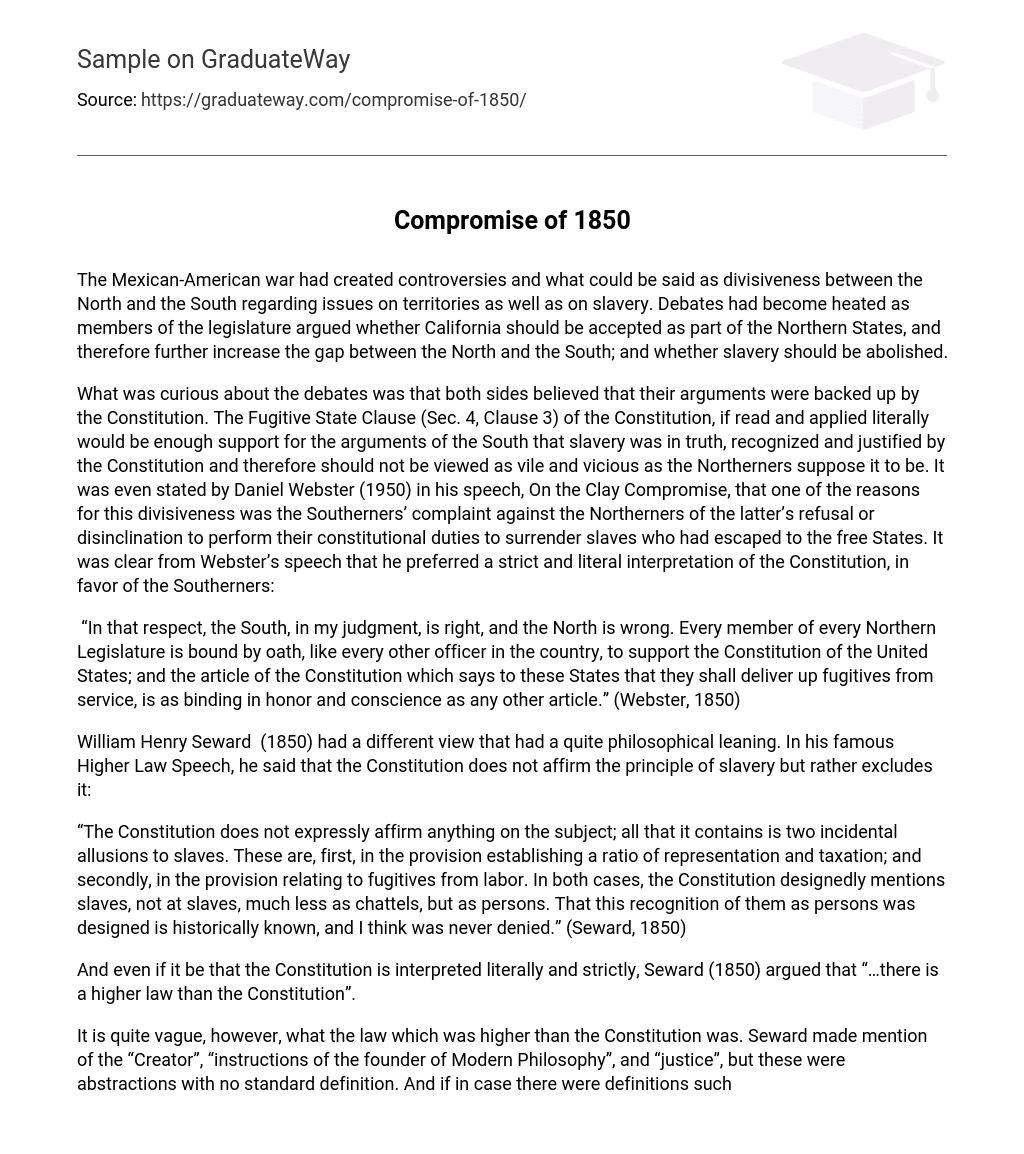The Mexican-American war had created controversies and what could be said as divisiveness between the North and the South regarding issues on territories as well as on slavery. Debates had become heated as members of the legislature argued whether California should be accepted as part of the Northern States, and therefore further increase the gap between the North and the South; and whether slavery should be abolished.
What was curious about the debates was that both sides believed that their arguments were backed up by the Constitution. The Fugitive State Clause (Sec. 4, Clause 3) of the Constitution, if read and applied literally would be enough support for the arguments of the South that slavery was in truth, recognized and justified by the Constitution and therefore should not be viewed as vile and vicious as the Northerners suppose it to be. It was even stated by Daniel Webster (1950) in his speech, On the Clay Compromise, that one of the reasons for this divisiveness was the Southerners’ complaint against the Northerners of the latter’s refusal or disinclination to perform their constitutional duties to surrender slaves who had escaped to the free States. It was clear from Webster’s speech that he preferred a strict and literal interpretation of the Constitution, in favor of the Southerners:
“In that respect, the South, in my judgment, is right, and the North is wrong. Every member of every Northern Legislature is bound by oath, like every other officer in the country, to support the Constitution of the United States; and the article of the Constitution which says to these States that they shall deliver up fugitives from service, is as binding in honor and conscience as any other article.” (Webster, 1850)
William Henry Seward (1850) had a different view that had a quite philosophical leaning. In his famous Higher Law Speech, he said that the Constitution does not affirm the principle of slavery but rather excludes it:
“The Constitution does not expressly affirm anything on the subject; all that it contains is two incidental allusions to slaves. These are, first, in the provision establishing a ratio of representation and taxation; and secondly, in the provision relating to fugitives from labor. In both cases, the Constitution designedly mentions slaves, not at slaves, much less as chattels, but as persons. That this recognition of them as persons was designed is historically known, and I think was never denied.” (Seward, 1850)
And even if it be that the Constitution is interpreted literally and strictly, Seward (1850) argued that “…there is a higher law than the Constitution”.
It is quite vague, however, what the law which was higher than the Constitution was. Seward made mention of the “Creator”, “instructions of the founder of Modern Philosophy”, and “justice”, but these were abstractions with no standard definition. And if in case there were definitions such may be as numerous and variegated as the number of persons who utter them. Even if there is a higher law, the question is whether or not there is a uniform standard that would allow the application of this higher law to all of the States and even to all the citizens?
In any case, the Compromise of 1850 aimed to balance the interests of the Northern and Southern States, as a means of thwarting what seemed to be an impending disunion. Apparently, some, if not most, feared that the South would have no choice but to secede. Calhoun (1850) firmly believed that the issues would indubitably end in disunion. In The Clay Compromise Measures, he suggested that the only way to prevent such disunion is to remove the cause of the agitation by the South by conceding to the latter an equal right to the acquired territory in order to establish a territorial equilibrium, and by ensuring faithful compliance with the “duty” regarding the fugitive slaves.
Such suggestion supposed that the nation was divided by the fact of legality or illegality of slavery in particular states and not necessarily the relative geographical positions of the states. If such was the case, the territorial equilibrium yearned for by the South was, even at that time, already on its way to being reduced to nil. It was apparent that the world trend at that time leaned towards the abolition of slavery. Britain, France and Mexico had already done it and other European countries were already preparing for the abolition (Seward, 1850). If the existence of territories such as those in the South depended on the existence of Slavery, then there was no doubt that its natural course would be towards inexistence. Unfortunately for the South, compromises and even Constitutional protection were not enough to reverse such trend.
Undoubtedly, proponents of the Compromise were concerned about the future of the South. After all, their economy is highly dependent on the existence of slavery and true enough, they experienced a significant decline in their economy immediately with the abolition of slavery a few decades after. But it is also a widely-accepted principle that leaders, in order to achieve good for their people must not limit itself to the security afforded by the present but must also be able to look forward or at least see the signs of the inevitable and transformative future, which may or may not involve sacrifices but assures progress.
References
Calhoun, J. (1850). The Clay Compromise Measures. Retrieved 20 April 2009 from http://www.nationalcenter.org/CalhounClayCompromise.html.
Seward, W. (1850). Higher Law Speech. Retrieved 20 April 2009 from http://facweb.furman.edu/~benson/docs/seward.htm.
Webster, D. (1850). On the Clay Compromise. Retrieved 20 April 2009 from http://www.bartleby.com/268/9/4.html.





